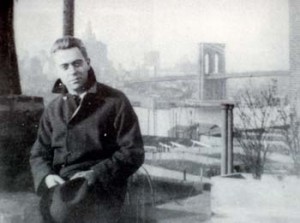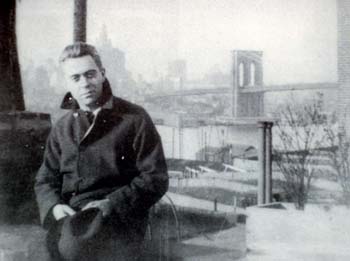 This one is from Mark Ford’s Selected Poems published by Coffee House Press (2014). Mark said this is the only prose poem he’s ever written. If, like me, you’re a fan of Hart Crane, it’s especially delicious. It’s in the form of a letter to a fictitious literary magazine. If you know nothing about Hart Crane, here is his most famous poem, To Brooklyn Bridge. A tortured gay man, who lived in a time when that was unacceptable, he allegedly committed suicide at 33 by jumping off a ship returning to New York from Mexico.
This one is from Mark Ford’s Selected Poems published by Coffee House Press (2014). Mark said this is the only prose poem he’s ever written. If, like me, you’re a fan of Hart Crane, it’s especially delicious. It’s in the form of a letter to a fictitious literary magazine. If you know nothing about Hart Crane, here is his most famous poem, To Brooklyn Bridge. A tortured gay man, who lived in a time when that was unacceptable, he allegedly committed suicide at 33 by jumping off a ship returning to New York from Mexico.
The Death of Hart Crane
Sir / Madam,
I was intrigued by the letter from a reader in your last issue that recounted his meeting, in a bar in Greenwich Village in the mid-sixties, a woman who claimed to have been a passenger on the Orizaba on the voyage the boat made from Vera Cruz to New York in April of 1932, a voyage that the poet Hart Crane never completed. According to her Crane was murdered and thrown overboard by sailors after a night of such rough sex that they became afraid (surely wrongly) that he might have them arrested when the boat docked in Manhattan. This reminded me of a night in the early seventies on which I too happened to be drinking in a bar in Greenwich Village. I got talking to an elderly man called Harold occupying an adjacent booth, and when the conversation touched on poetry he explained, somewhat shyly, that he had himself published two collections a long time ago, one called White Buildings in 1926, and the other, The Bridge, in 1930. I asked if he’d written much since. ‘Oh plenty,’ he replied, ‘and a lot of it much better than my early effusions.’ I expressed an interest in seeing this work, and he invited me back to his apartment on MacDougal Street. Here the evening turns somewhat hazy. I could hear the galloping strains of Ravel’s Boléro turned up loud as Harold fumbled for his keys. Clearly some sort of party was in progress. At that moment the door was opened from within by another man in his seventies, who exclaimed happily, ‘Hart! – and friend! Come in!’ The room was full of men in their seventies, all, or so it seemed, called either Hart or Harold. The apartment’s walls were covered with Aztec artefacts, and its floors with Mexican carpets. It dawned on me then that Hart Crane had not only somehow survived his supposed death by water, but that his vision of an America of the likeminded was being fulfilled that very night, as it was perhaps every night, in this apartment on MacDougal Street. At the same instant I realized that it was I, an absurd doubting Thomas brought face to face with a miracle, who deserved to be devoured by sharks.
Yours faithfully,
Name and address withheld
by Mark Ford
 Hart Crane was one of my favorite poets when I was a teenager. I used to wander around reciting his musical poems aloud. His most famous poem is “To Brooklyn Bridge.” Now he seems almost unnoticed, so I thought I’d post one of his that I remember. I especially love the last four lines.
Hart Crane was one of my favorite poets when I was a teenager. I used to wander around reciting his musical poems aloud. His most famous poem is “To Brooklyn Bridge.” Now he seems almost unnoticed, so I thought I’d post one of his that I remember. I especially love the last four lines.